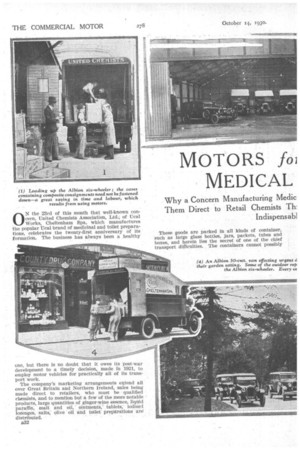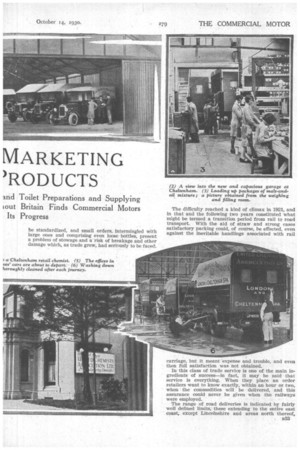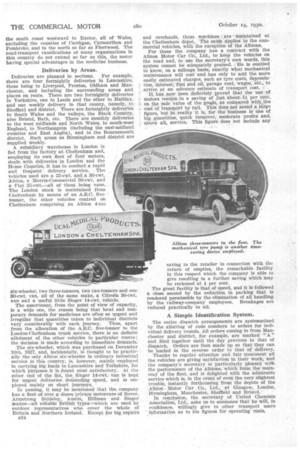MOTORS fol
Page 58

Page 59

Page 60

If you've noticed an error in this article please click here to report it so we can fix it.
MARKETING MEDICAL
)RODUCTS ON the 23rd of this month that well-known concern, United Chemists Association, Ltd.; of Ucal Works, Cheltenham Spa, which manufactures the popular Ucal brand of medicinal and toilet preparations, celebrates the twenty-first anniversary of its formation. The business has always been a healthy
one, but there is no doubt that it owes its post-war development to a timely decision, made in 1921, to employ motor vehicles for practically all of its transport work.
The company's marketing arrangements extend all over Great Britain and Northern Ireland, sales being made direct to retailers, who must be qualified chemists, and to mention but a few of the more notable • products, large quantities of ginger-wine essence, liquid paraffin, malt and oil, ointments, tablets,iodized lozenges, salts; olive oil and toilet preparations are distributed.
B32 These goods are packed in all kinds of container, such as large glass bottles, jars, packets, tubes and boxes, and herein lies the secret of one of the chief transport difficulties. The containers cannot possibly be standardized, and small orders, intermingled with large ones and comprising even loose bottles, present a problem of stowage and a risk of breakage and other damage which, as trade grew, had seriously to be faced. The difficulty reached a kind of climax in 1921, and in that and the following two years constituted what might be termed a transition period from rail to road transport. With the aid of straw and strong cases satisfactory packing could, of course, be effected, even against the inevitable handlings associated with rail carriage, but it meant expense and trouble, and even then full satisfaction was not obtained.
In this class of trade service is one of the main ingredients• of success—in fact, it may be said that service is everything. When they place an order retailers want to know exactly, within an hour or two, when the commodities will be delivered, and this assurance could never be given when the railways were employed.
The range of road deliveries is indicated by fairly well defined limits, these extending to the entire east coast, except Lincolnshire and areas north thereof, 1333
the south coast westward to Exeter, all of Wales, excluding the counties of Cardigan, Carmarthen and Pembroke, and to the north so far as Fleetwood. The road-transport ramifications of many organizations in this country do not extend so far as this, the motor having special advantages in the medicine business.
Deliveries by Areas.
Deliveries are planned in sections. For example, there are four fortnightly deliveries in Lancashire, these being to Liverpool, Preston, Oldham and Manchester, and including the surrounding areas and places en route. There are two fortnightly deliveries in Yorkshire, one to Leeds and the other to Halifax, and one weekly delivery in that county, namely, to Sheffield and district. There are fortnightly deliveries to South Wales and the valleys, the Black Country, also Bristol, Bath, etc. There are monthly deliveries to the west midlands and North Wales, to south-west England, to Northamptbn (including the east-midland counties and East Anglia), and to the Bournemouth district. Such areas as Birmingham and district are supplied weekly.
A subsidiary warehouse in London is fed from the factory at Cheltenham and, employing its own fleet of four motors, deals with deliveries in London and the Home Counties, it has to conduct a rapid and frequent • delivery service. The vehicles used are a 25-cwt. and a 30-cwt. 'Albion, a Morris-Commercial 30-cwt. and
a Fiat 25-cwt.—all of -them being vans. The London stock is maintained from Cheltenham by means of an A.E.C. fivetomer, the other vehicles centred on Cheltenham comprising an Albion 4-ton
six-wheeler, two three-tonners, two two-tonners and one 30-cwt. van, all of the same make, a Citroen 30-cwt. van and a useful little Singer 14-cwt. vehicle.
The assortment, from the point of view of capacity, is a wide one, the reason being that local and temporary demands for medicines are often so urgent and irregular that quantities taken to individual districts vary considerably with each journey. Thus, apart from the allocation of the A.E.C. five-tonner to the London-Cheltenham trunk service, there is no definite allotment of the other vehicles to particular routes; the decision is made according to immediate demands.
The six-wheeler, which was purchased on December 19th, 1927, and, incidentally, is thought to be practically the only Albion six-wheeler in ordinary industrial service in this country, is, however, mainly employed in carrying big loads to Lancashire and Yorkshire, for which purposes At is found Most _satisfactory. At the other end of the list, the. Singer 14-cwt., van is kept for urgent deliveries, demanding speed, and 4s employed mainly on short journeys,
In passing, it may be mentioned that the, company has a fleet of. over a dozen private motorcars of Rover, Armstrong Siddeley, Austin, Hillman and Singer
:naked 'all reliable British types=which are used by outdoor representatives who cover the whole of Britain and Northern Ireland. Except for big, repairs B34
and overhauls, these machines are maintained at the Cheltenham depot The same applies to the commercial vehicles, with the exception of the Albions.
For these the company has a contract with the Albion Motor Car Co., Ltd., to keep the vehicles on the road and, to use the secretary's own words, this system cannot be adequately praised. He is enabled to know, on a mileage basis, exactly what mechanical maintenance will cost and has only to add the more easily estimated charges, such as tyre costs, depretiation, interest; fuel and oil, garage rent wages, etc., to arrive at an advance estimate of transport cost.
It has now been definitely proved that the use of motors results in a saving of just Aboutft per cent. on the sale value of the goods, as compared with„the cost of transport by rail. This does not sound a large figure, but in reality it is, for the business is one of big quantities, quick turnover, moderate profits and, above all, service. This figure does not include any saving to the retailer in connection with the return of empties, the remarkable facility in this respect which the company is able to give resulting in a further saving which may be reckoned at per cent.
The great facility is that of speed, and it is followed a close second by the reduction in packing that is rendered permissible by the elimination of all handling by the railway-company employees. Breakages are reduced practically to nil.
A Simple Identification System.
The entire dispatch arrangements are systematized by the allotting of code numbers to orders for individual delivery rounds. All orders coming in from Manchester and• district, for example, are marked "A" and filed together until the day previous to that of dispatch. Orders are then made up so that they can be loaded in the reverse order to that of delivery.
Thanks to regular attention and fair treatment all the vehicles are giving satisfaction in their work, and the company's secretary is particularly pleased with the performance of the Albions, which form the mainstay of the fleet, and is delighted with the admirable service which is, in the event of even the very slightest trouble, instantly forthcoming from the depots of the Albion Motor Car Co., Ltd., at Glasgow, London, Birmingham, Manchester, Sheffield and Bristol.
In conclusion, the secretary of United Chemists Association, Ltd., asks us to announce that he will, in confidence, willingly give to other transport users .information as to his figures for operating 'costs.




















































































































